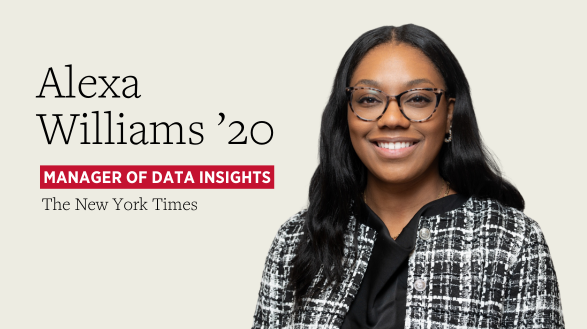From code to The Times
After graduating from CEC with a degree in Software Engineering, Alexa Williams '20 is now Manager of Data Insights at The New York Times.

When Alexa Williams graduated from Miami University with a degree in Software Engineering and a minor in Information Systems and Analytics, she wasn’t chasing the typical tech path. While many peers headed straight into traditional engineering roles, she was already leaning toward something a little more unexpected—data storytelling, user behavior analysis, and, eventually, a dream job at The New York Times. “I’ve been at The New York Times for four years now,” she says. “I started off as a Senior Data Analyst. I worked on The New York Times Cooking product, actually.”
That first role blended her technical foundation with something more human: curiosity about how people interact with the tools and platforms around them. “A lot of my work was centered around user behavior and customer analysis,” she explains. That focus on people—how they think, how they choose, and how they engage—helped shape her transition into a new role as Manager of Data Insights. “I get to work on all of our products and get insight into how we really pull customers in and make sure they are engaged… It’s a really exciting role for me.”
What’s striking is how much of her career has been built on that exact spark: excitement. She credits her early love of math and statistics for giving her a foundation, but it was Miami’s Digital Innovation Program in San Francisco that turned that interest into something tangible. “I was awarded the opportunity to do an internship at what is now GrubHub,” she says. “That’s really what started it off for me…I can manipulate numbers to mean things.” Realizing that she could use data to create meaning rather than merely crunch numbers changed everything.
After graduation, she landed a role in data engineering at a Cleveland startup, but the pull toward analysis—toward thinking through human questions with data—never faded. “I really like sports, I like media. I like entertainment,” she says. “And I think a lot of my career has been me just trying stuff, seeing if I like it, and seeing if it makes sense.” The opportunity at The New York Times checked all her boxes: tech, curiosity, creativity, and cultural impact.
Now working across departments on marketing and engagement strategies, she applies her skills with both technical precision and critical context. “You can literally use data in any industry, in any context. It doesn’t have to be boring,” she says. “I’m definitely a natural problem solver…You get to sort of be creative about how you think about the problem and formulate it from end to end…create these hypotheses and prove or disprove what you thought through data.”
But she’s quick to add that data isn’t a magic wand. Without interpretation, data can be misleading or even harmful. “Ultimately, people are biased,” she says. “A lot of the decisions that you make in your career, when it comes to data, you’ll be presented with the numbers, but you have to be able to apply the business context to it.” That ability to read between the numbers is something she began building at Miami, where her academic experience wasn’t just technical, but multidimensional. It’s an ability she’s continued to develop through further education, such as the Master’s degree in Business Analytics and AI from New York University she’ll complete this month.
“Having all those different understandings of how business works helps so much,” she says. “It definitely sets you apart from a lot of other people.” That diverse foundation even extended to creative skills. “When I graduated from Miami…in software engineering, you had to have a track,” she recalls. “And it was more of a creative thing. So it was like doing Photoshop and the Adobe package.” She turned that into a side business making flyers, a venture that sharpened her design instincts and helped her connect the dots between data, communication, and creativity.
After all this career development, that software engineering background still matters a lot to her. “I am, number one, able to communicate better with engineering stakeholders, and I’m also able to do a lot of those things myself,” she says. “I know exactly what these databases are supposed to look like, and I know the end as a user, what it should look like.” That dual fluency—understanding both the backend structure and the user-facing impact—is part of what makes her such a valuable player in cross-functional teams.
Looking back, she’s grateful she didn’t box herself into a narrow idea of what someone with a tech degree is “supposed” to do. “I definitely think it’s worth thinking outside the box a little,” she says, “and maybe applying your tech degree to some other interests you have.” For students who love both logic and language, statistics and storytelling, her journey is a reminder: sometimes, the most meaningful career paths are the ones you design for yourself.